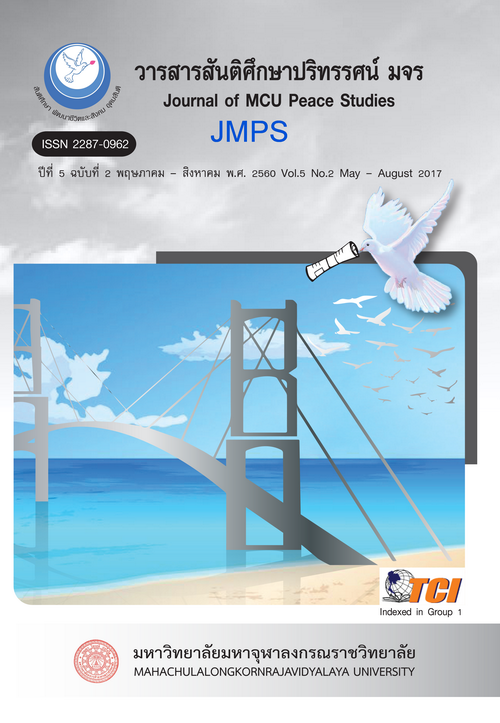The Pattern of Offering Dāna Helping One to the Enlightenment of the Dhammas in the Present Thai Societies
Main Article Content
บทคัดย่อ
This research is of the 3 :- (1) to study the principles and methods in offering Dãna according to the principles of Theravada Buddhism, (2) to study analyzed the problems and the obstacles in offering the alms in the present Thai societies, and (3) to present the patterns of offering Dãna helping one to attain the Dhammas in the present Thai societies.
From the research, it is found that the presentation of means that anyone who sacrifices and deserves any beneficial belongings or things to the receivers both of mind and matters for their own personal benefits to be able to leave out the avariciousness, for abandon the stinginess and to discard the egocentricity (selfishness). In addition, one is able to normally achieve ones happily-leading life both in bodies and in mind for the advantages of receivers. According to the utmost benefits for all parties, their ambitions intended via the Dukka the quenching and the ending of whole problems absolutely without any defilement, in other words, the enlightenment. Nowadays, Thai Societies have offered the alms giving, emphasizing on almost egoistically becoming as self-centeredness.; that is – the increase of defilement and desire mostly present and future, in spite of both of the principles and the methods of alms-giving are approximately similar and nearly different. However, these actions still depend on the alms-giving patterns according to the Tipitaka principles as well as the commentaries and sub-commentaries. In terms of providing with the four requisites, the objects or any things beneficial to the receivers called “material gifts”, the givers really trusted on the donation with a portion as charity, generosity, sacrifice; or greed:- covetousness. For this reason, the alms-giving emphasizing on the self-benefits without revenges with anyone the fact of which is called “benefaction alms-giving” or “angry relief”. Moreover, when the delusion or the ignorance relieve, it must be the alms-giving by wisdom. In other words, the Concentration and Vipassanã Development are called “gifts of the Dharma”. For these reasons, both of the givers and the receivers have a good chance to develop their minds to be free from the powers of defilements and the desire until truthfully extinguish through the enlightenment. For the pattern of alms-giving assisting the enlightenment in the contemporary societies, these actions before either action or donation should be of faith and wisdom. In the meantime, the present donation should be composed of sati – “Mindfulness” and “Sampajañña”- clear consciousness or awareness. After the completion of alms-giving, ones should trust on ones’ mind as emptiness without any thought as oneself. Otherwise, one will actually restraint one’s mind without any return.
From the research, it is found that the presentation of means that anyone who sacrifices and deserves any beneficial belongings or things to the receivers both of mind and matters for their own personal benefits to be able to leave out the avariciousness, for abandon the stinginess and to discard the egocentricity (selfishness). In addition, one is able to normally achieve ones happily-leading life both in bodies and in mind for the advantages of receivers. According to the utmost benefits for all parties, their ambitions intended via the Dukka the quenching and the ending of whole problems absolutely without any defilement, in other words, the enlightenment. Nowadays, Thai Societies have offered the alms giving, emphasizing on almost egoistically becoming as self-centeredness.; that is – the increase of defilement and desire mostly present and future, in spite of both of the principles and the methods of alms-giving are approximately similar and nearly different. However, these actions still depend on the alms-giving patterns according to the Tipitaka principles as well as the commentaries and sub-commentaries. In terms of providing with the four requisites, the objects or any things beneficial to the receivers called “material gifts”, the givers really trusted on the donation with a portion as charity, generosity, sacrifice; or greed:- covetousness. For this reason, the alms-giving emphasizing on the self-benefits without revenges with anyone the fact of which is called “benefaction alms-giving” or “angry relief”. Moreover, when the delusion or the ignorance relieve, it must be the alms-giving by wisdom. In other words, the Concentration and Vipassanã Development are called “gifts of the Dharma”. For these reasons, both of the givers and the receivers have a good chance to develop their minds to be free from the powers of defilements and the desire until truthfully extinguish through the enlightenment. For the pattern of alms-giving assisting the enlightenment in the contemporary societies, these actions before either action or donation should be of faith and wisdom. In the meantime, the present donation should be composed of sati – “Mindfulness” and “Sampajañña”- clear consciousness or awareness. After the completion of alms-giving, ones should trust on ones’ mind as emptiness without any thought as oneself. Otherwise, one will actually restraint one’s mind without any return.
Article Details
รูปแบบการอ้างอิง
Kanlayanadhammo, P. (2017). The Pattern of Offering Dāna Helping One to the Enlightenment of the Dhammas in the Present Thai Societies. วารสารสันติศึกษาปริทรรศน์ มจร, 5(2), 133–143. สืบค้น จาก https://so03.tci-thaijo.org/index.php/journal-peace/article/view/79527
ประเภทบทความ
บทความวิจัย
ทัศนะและความคิดเห็นที่ปรากฏในบทความในวารสาร ถือเป็นความรับผิดชอบของผู้เขียนบทความนั้น และไม่ถือเป็นทัศนะและความรับผิดชอบของกองบรรณาธิการ ยินยอมว่าบทความเป็นลิขสิทธิ์ของวารสาร


